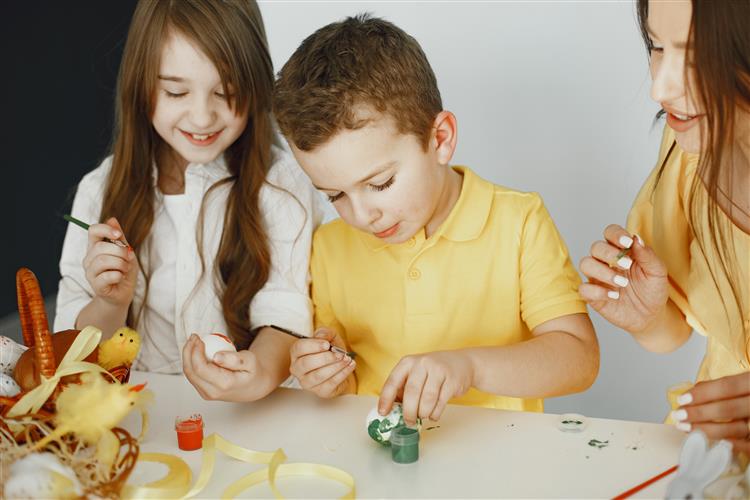- info@brightkidspreschool.com
Acquisition of Social Skills in Children

When monitoring children's development, one of the areas evaluated is social development.
Social development is assessed based on how a child positions themselves and others and the behaviors they produce accordingly. In this process, the acquisition of social skills in children plays a significant role in social development evaluation.
Social skill is the process through which a person understands their own and others' emotions, thoughts, and behaviors in interpersonal or social relationships, and plans and exhibits their own behaviors based on this understanding. In the context of children's lives, a similar awareness, empathetic understanding, and behavioral development are expected.
When examining the fundamental concepts of social skills within social relationships, we encounter the following concepts:
? Reciprocity
? Empathy
? Understanding
? Emotion & Thought
? Sharing
? Reaction
? Listening
? Expression
Considering these concepts, a good social relationship primarily involves self-awareness, self-confidence, and self-reflection, followed by sharing and adapting behaviors. While supporting our children in developing good social relationships and enhancing their social skills, the steps to be taken within both school and family settings should align with these priorities. The following fundamental behaviors are expected to be seen in children with
well-developed social skills:
? Ability to start and end conversations with peers or adults
? Ability to use self-introduction sentences at the beginning of conversations
? Ability to listen to responses during conversations and provide appropriate answers
? Ability to express and share their own ideas
? Planning sequential behaviors appropriate to the flow of conversation
? Ability to work collaboratively and pursue a common goal
How Do Children Learn and Develop Social Skills?
Modeling & Imitation: Given that parents are considered the first social models in a child's life, acquiring behaviors by modeling from within the home is a common occurrence. The positive or negative behaviors of individuals observed, modeled, or imitated within the family are often emulated by children, serving as references in the social skill acquisition process. Initially, parents should display 'empathetic, understanding, inclusive, evaluative,
curious, and expressive' attitudes, which will allow children to witness healthy social behaviors through social modeling. Children quickly imitate positive behaviors observed from role models.
Encouragement-Guidance-Feedback: The social modeling method is a behavioral guidance approach. In addition to behavioral guidance, cognitive guidance is also highly functional for acquiring social skills. Encouraging children to initiate and maintain social relationships and activities is one of the first steps in the encouragement process. Supporting a child in expressing themselves also helps build their confidence in social relationships. Children who are encouraged in social relationships, supported in relevant skills, and guided on how to manage social interaction processes are expected to develop healthy social skills. Evaluating a child’s social skills with a moderate and positive tone, comparing 'what was said - what did the child do?' and providing feedback is also very supportive for long-term social skill acquisition.
In summary, supporting children in self-awareness and expression, providing both behavioral and cognitive previews of correct skills as role models, and being individuals who offer constant trust and support are crucial supportive behaviors for children to establish healthy social relationships and develop social skills from an early age within both home and school dynamics. One of the processes that play an important role in the development of social
skills is the process of children experiencing problems and seeking support in solving problems. Supporting problem-solving skills will also increase the comprehensiveness of social skill acquisition in children.
Problem-Solving Skills in Children
Considering the rapidly developing brain structures and the increasing social experiences over time, it is quite common for children to perceive many situations as problems and feel unhappy about them. In a child's world, a 'problem' might be sharing a toy, not being included in a game, or seeing a friend hugging another friend. These situations can be considered problems, sources of unhappiness, or crises in a child's world. Having problem-solving skills in this process significantly facilitates children's social relationships.
Given children's impulsive nature, a fundamental role of adults in teaching problem-solving
skills is to slow down their impulsiveness, activate their cognitive processes, and guide the behavioral process accordingly.
Problem-solving skills have the same foundation for both children and adults.
Problem-Solving Skill = Understanding the Situation (Initial Reaction) +
Identifying What to Change + Planning the Steps to Achieve It + Implementing the
Plan
According to this equation, the first stage of the problem-solving process for children is recognizing what they see as a problem and articulating it. Following that, detailing their thoughts and feelings about liked/disliked situations and understanding what they want to see differently constitutes the continuation of the process.
A crucial skill in problem-solving is having empathetic and flexible thinking. Showing
children the perspective of "there could be another situation, we can think this way too," and familiarizing them with this perspective at home and school will support the problem-solving process.
To summarize the problem-solving process:
1. Recognize & Name & Define the Problem
2. Generate Solution Ideas & Share Ideas & Ask for Help
3. Implement Planned Solution Steps & Take Responsibility for Trial and Error
4. Evaluate Cognitive and Emotional States
When considering the parent's role in acquiring problem-solving skills, the fundamental role is to be a model. Especially in 'problems' between parents and children, a moderate, questioning, and expressive attitude from the parent will serve as a reference for children in their own social problem-solving processes. Additionally, during a 'problem situation', listening to the child’s problem, asking additional questions to understand, and trying to learn their feelings and thoughts are very functional in the modeling process. This encourages children to think and notice. Subsequently, waiting for a solution proposal from the child, developing the solution together, and encouraging the child to take action are also part of the parent's roles in the process of acquiring problem-solving skills.
We Will Call You For More Information
Please leave your contact information and we will contact you shortly
